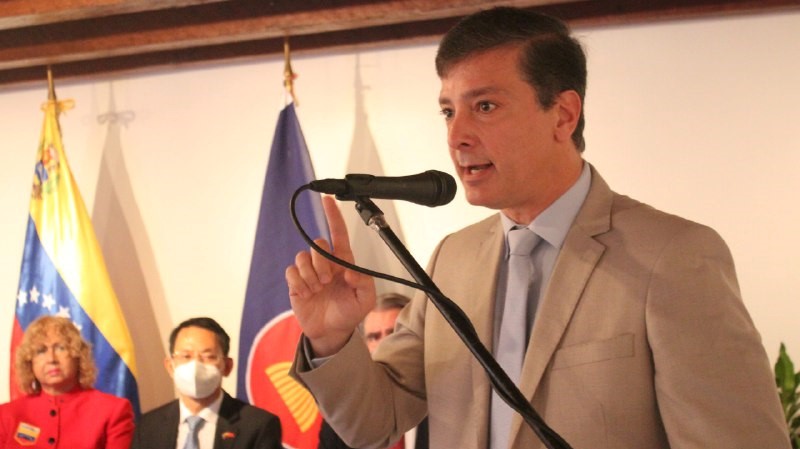This Thursday, as part of the actions of the National Executive in favor of strengthening cooperation relations for the economic and commercial development of the country, Venezuela hosted the IV Conference of the Association of Southeast Asian Nations (ASEAN).
The event held at the “La Estancia” art center in Caracas and organized by the Ministry of Foreign Affairs of the Bolivarian Republic of Venezuela in collaboration with the Embassies of Malaysia, Indonesia, and Vietnam. Among the participants were various representatives of public and private institutions involved in the productive and economic sectors of the country.
Capaya Rodriguez, Vice Minister for Asia, Middle East, and Oceania, highlighted the importance of this great event where were presented various relevant topics on cooperation and coordination between peoples. Through this, the political and commercial ties between nations were strengthened to ensure the mutual benefit and welfare of Venezuelans as other inhabitants of the member countries of the ASEAN.
“Our purpose is to strengthen bilateral relations and work together to consolidate Venezuela’s rapprochement with ASEAN member states. By reaffirming the Venezuelan government’s total rejection of the application of illegal unilateral coercive measures that attempt against a people determined to respect its sovereignty and its destiny, as demonstrated in the past elections of November 21,” said Vice Minister Rodriguez.
The meeting took place under the slogan “Working together to strengthen commercial, tourist and educational cooperation” seeks to consolidate agreements in cultural, political, and investment matters. The common objective is to increase the level of commercial exchange and attract investments that will allow the signing of the Treaty of Amity and Cooperation in Southeast Asia (TAC).
Consolidation of productive ties
The activity counted with the participation of the People’s Power Ministries of Industries and National Production; Economy, Finance and Foreign Trade; Housing; Tourism; Culture; University Education; the National Bank of Foreign Trade (BANCOEX), as well as the Institute of Training and Socialist Education (INCES).
On behalf of the country’s productive sector, Jose Biomorgi, the Vice-Minister of Industrial Development, indicated that according to the World Bank’s figures, 2020 was a year of a deep crisis that affected the productive system and caused a fall in the World Gross Domestic Product of an average of 3.4%. Meanwhile, the growth of up to 6% it’s been previously evidenced.
“According to the World Bank figure, the value of the manufacturing product presented 15.8% worldwide in 2020 when the average until 2019 was 16%. That means that despite the fall, the manufacturing product shows relevant growth. The same happened in Latin America and the Caribbean that even despite the economic fall the industrial growth figure stood at 13% when the sustained average since 2000 was 11%,” he referred.
Similarly, the vice minister indicated that in 2019 the ASEAN countries presented a relevant growth that, like the rest of the world, was affected in 2020, except for the Socialist Republic of Vietnam. That is why the Venezuelan productive sector is studying the industrial development plan of that nation to emulate actions that allow these results.
“Despite the deep crises that hit our countries, the industrial sector is a key factor in the economic development of any nation or region, and that is where the challenges come from,” he stressed.
Biomorgi also pointed out that the sister countries of the ASEAN have given a great lesson to the Venezuelan people in political matters. “Despite the differences in governments and systems, they have maintained the interest of the people, and this event is a great opportunity for us to strengthen ties and continue advancing in industrialization.”
The Vice Minister concluded by announcing that the Industries and National Production portfolio is currently designing an Industrial Development Plan. The plan covers ten years, and it divides into short period phases that consider the needs of Venezuelans and has as motors the Homeland Plan 2019-2025 and the Bolivarian Economic Agenda.
Over the years, ASEAN has become a stable regional association, which is why they highlighted the need to create a “productive chain” that integrates the Venezuelan engines through a broad vision of industrial development to strengthen bilateral relations and the economic development of the member nations of this coalition.


